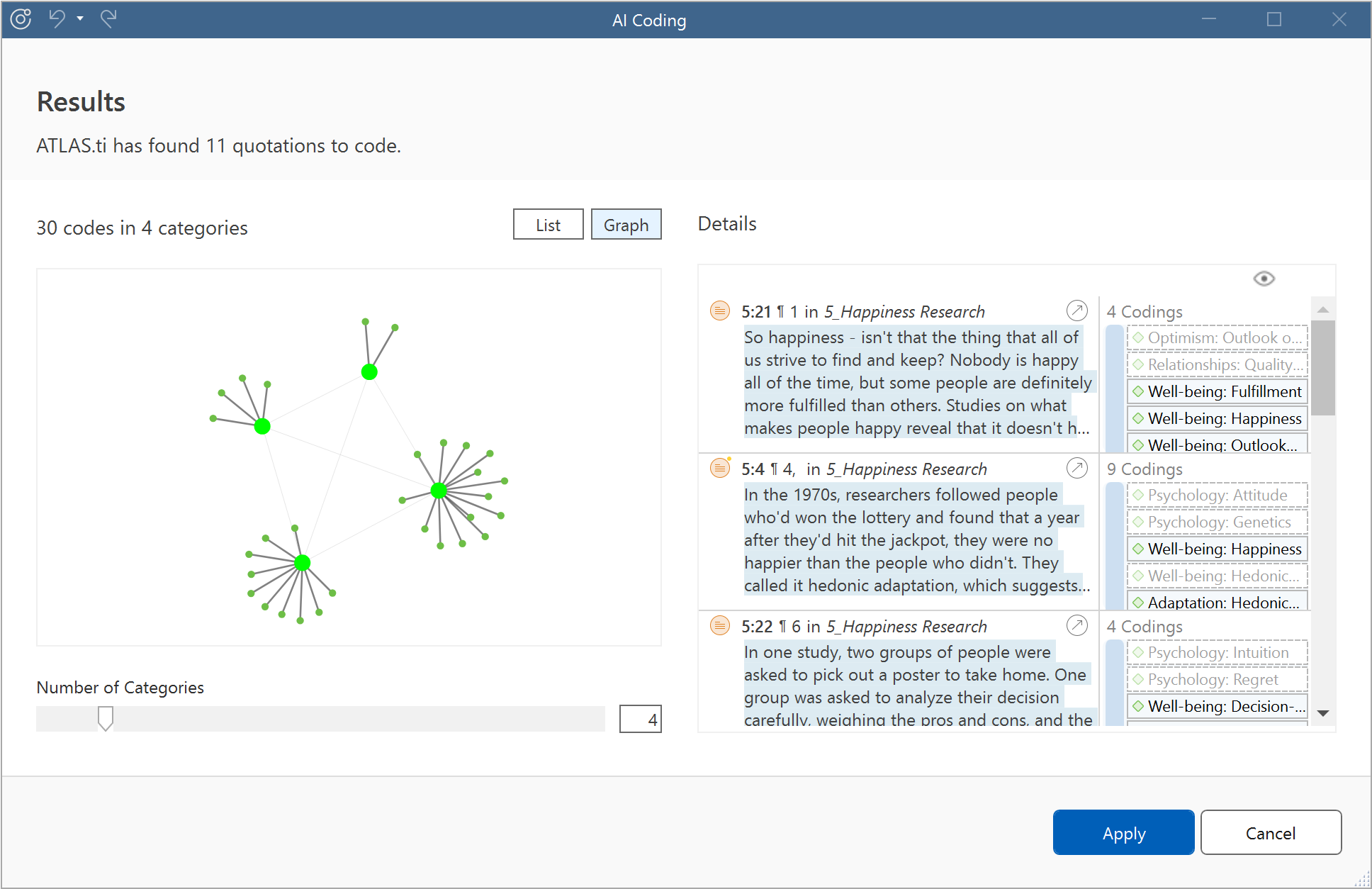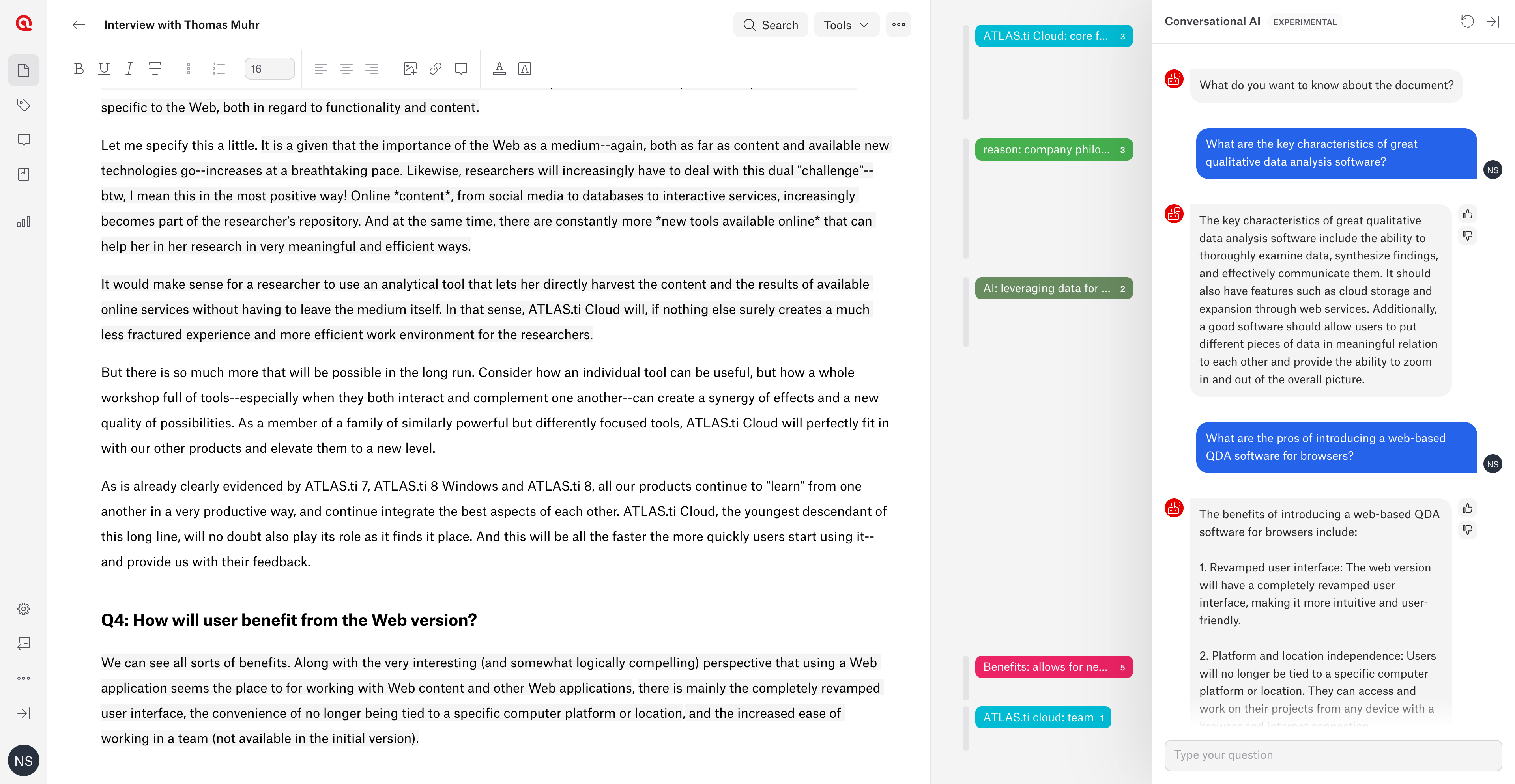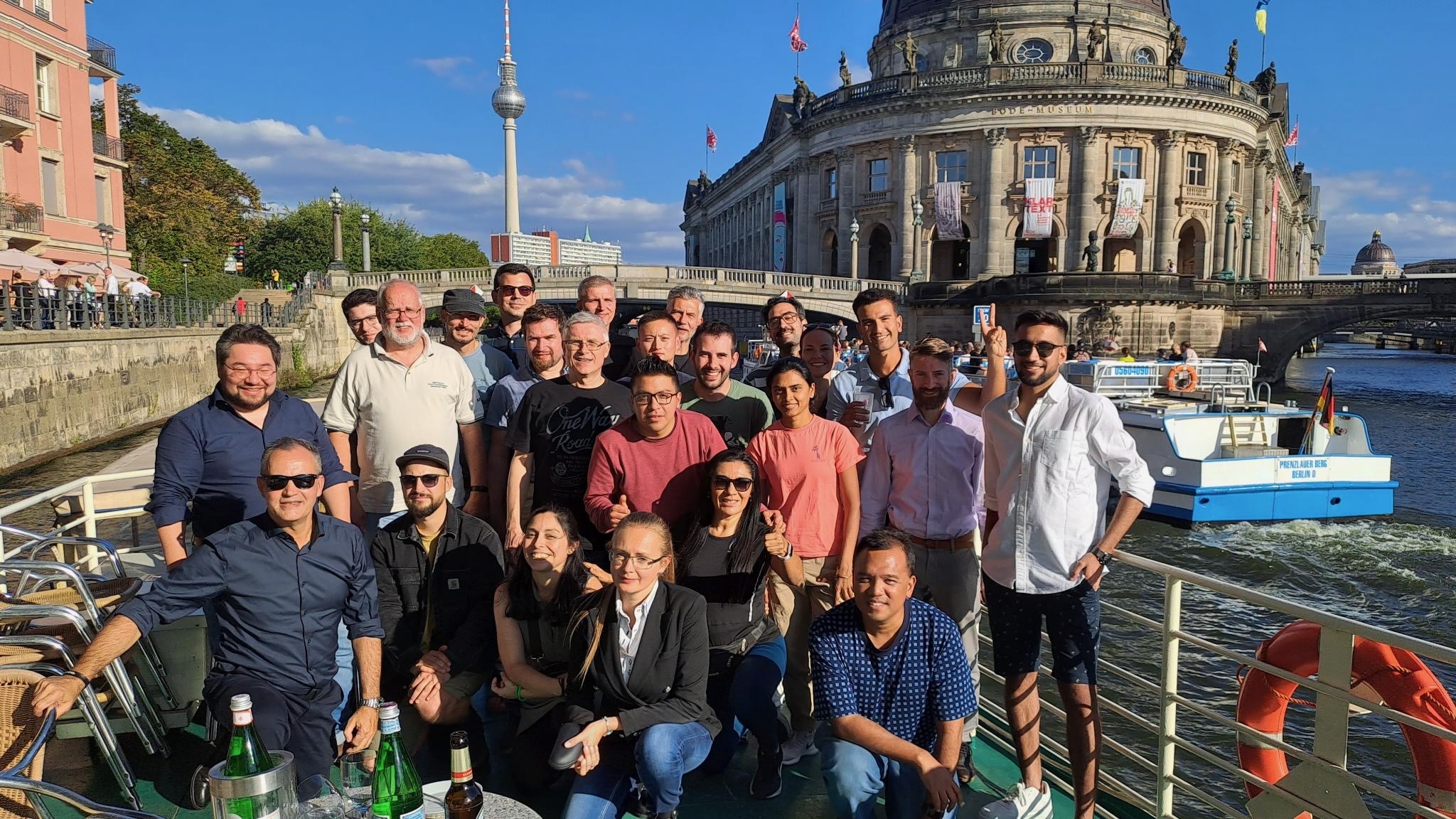The Future of AI: ATLAS.ti's Vision for Comprehensive, Connected, AI-Powered Research
Introduction
In the rapidly advancing world of artificial intelligence (AI), AI is set to become an omnipresent tool for diverse applications in various fields, effectively replacing conventional isolated solutions. This includes an AI-powered multifunctional tool capable of generating solutions and results previously achieved through various separate approaches and providers. With the ability to ask questions and give instructions in the form of voice or text inputs and further optimize them through interaction with AI in a "conversation," AI will revolutionize our lives and usher in a new era of efficiency and innovation.

The interaction between humans and AI will be designed to be as simple and intuitive as possible. In this AI-centric world, ethics related to AI will be critical. There will be regulations and guidelines to ensure that AI systems are used fairly, transparently, and responsibly. The development and application of AI will be accompanied by a strong ethical framework.
In addition to the ever-advancing automatic processing of large amounts of unstructured data such as text, audio, video recordings, or images, and their analysis and association with keywords, themes, or patterns, AI will also be able to consider the context of qualitative data, enabling deeper analysis. For instance, it will be able to understand and interpret the social, historical, or cultural background of texts or conversations. It will establish connections between content that is not directly discernible, a task currently achievable only through human insight. Advanced AI models will identify trends and patterns in qualitative data that may not be immediately obvious to researchers or would be very time-consuming to capture. Researchers will be able to train AI models to identify and analyze specific topics or concepts in their data according to their intentions. AI will learn to use these inputs in the subsequent analysis process, much like the researcher, creating analysis. All of this will contribute to gaining insights faster and uncovering connections better.
How ATLAS.ti is addressing AI trends
Here at ATLAS.ti we are committed to continuously supporting researchers in harnessing the latest AI knowledge as tools within ATLAS.ti, providing them with their own AI agents that are always up to date with technology and AI developments, all available for free. With our software ATLAS.ti, our goal is to push forward the integration of AI to the extent that artificial intelligence becomes an indispensable resource for all qualitative researchers, seamlessly aligning with existing methods and functions.
We take pride in offering software that caters to the needs of researchers across all disciplines and anticipates future requirements. Tools like automatic AI coding of entire documents, AI summaries for documents and quotations, and AI-assisted code suggestions for quotations generated automatically when marking text passages are already available for free and remain central to our efforts to integrate artificial intelligence into qualitative research. These features allow users to gain insights faster and more easily than would be possible through manual analysis. With these features and others currently in development and some on the verge of introduction, we will transform AI into the ultimate virtual agent, guiding researchers through every step of the qualitative research process.
We are also aware that this is a time of intense change and upheaval for our users. AI can be an intimidating resource for qualitative researchers, which is why our software will offer an intuitive application of AI that guides researchers step by step through the process. Our commitment to supporting users with life-support methodological guidance and project optimization, along with extensive free learning resources, underscores our efforts to make the research experience as good and easy as possible for individual users. This approach not only supports users' research goals but also makes ATLAS.ti a unique platform for those who use it. We combine user feedback with our deep expertise in qualitative research and technology to actively address the needs and projects of researchers. Our AI tools, as well as all other analytical functions, would not be at their current level without the ongoing dialogue we maintain with our users and internally.
Responding to researchers’ needs
Even for those researchers who have not fully grasped the potential of AI in their work, we believe it is our responsibility to offer intuitive tools that showcase the capabilities of AI and make qualitative research accessible to everyone, everywhere. AI has the power to help researchers embrace uncertainty and foster a sense of security in evaluating data in their projects. With generative AI, advances in research methods, and global trends shaping the data analysis landscape, ATLAS.ti is committed to making innovative AI-supported tools accessible worldwide at a price that is affordable for users of all backgrounds and needs, leaving no one behind.
Finding the balance between intuitive user-friendliness and complex functionality is one of our most important tasks. The tireless efforts and heartfelt dedication of our developers and supporters who drive ATLAS.ti have led to the development of software that is both effective and exceptionally user-friendly. We believe that no other platform allows you to analyze data as quickly, simply, and thoroughly to gain deeper insights, and we invite everyone to verify our commitment with our platform and the comprehensive support we provide.
Learning from the ATLAS.ti community and supporting researchers everywhere
By developing software that works for every researcher, we aim to support and promote research. ATLAS.ti is more than just data analysis software; it is a global community of researchers that has thrived for decades. Our close collaboration as researchers with users, other researchers, and technology experts has positioned us at the forefront of innovation in data analysis applications. We further support researchers with our free worldwide live support, 24 hours a day / five days a week, free webinars, training, YouTube videos, methodological blog articles, best practices, our research guide, and many other resources to stay up to date with innovations in qualitative research. We stand by users in real-time, with every user, on every project.

These resources advance our goal of fostering better research through skilled and knowledgeable researchers. While AI tools are the centerpiece of our data analysis software, we believe that expertise can make the most out of AI’s capabilities in qualitative research. This is also why we offer self-paced courses in qualitative research and programs for trainer certification and methodological certification in our ATLAS.ti Academy. These programs serve all kinds of researchers looking to advance their careers and expand their skill sets in qualitative research, which is why we make education in qualitative methods an essential part of the ATLAS.ti experience.
The role of AI in research
Whether researchers are interested in AI applications in qualitative research, need a refresher on core data collection and analysis methods, or simply seek a partner in their research process, ATLAS.ti is the go-to destination for qualitative research needs. We help users become better researchers, and our users help us become leaders in the field of qualitative data analysis through their feedback.
This is also why we see AI as a virtual agent rather than a replacement for human-led research. There is no doubt that AI has already significantly transformed our world, and its influence will continue to grow. The human element will always be indispensable in research, even as AI automates many tasks and accelerates research exponentially. ATLAS.ti serves as a bridge between technology, AI, and human researchers, constantly evolving to make useful technologies accessible while upholding the principles of rigorous and responsible research.
ATLAS.ti AI-powered tools researchers can harness
With the latest features we are diligently working on in our ATLAS.ti AI Lab, we provide researchers with the ability to modularly use AI to achieve even better, faster, and more targeted results. Users can tailor the analysis specifically to their content and be guided through the AI application process, with each step explained in detail. Researchers have the freedom to choose which AI-supported features they want to apply to their projects and which ones they don't. This allows users to apply different AI-supported tools and then examine the different results to decide which tools optimize their analysis. They can thus make the most of their human analytical abilities with the help of ATLAS.ti AI.
An important step we have already taken with the introduction of the current version 23.2.3 is the better visualization and scalability of AI results. This free update enables researchers to better and more quickly select and correct results from and after AI analysis according to their needs by manually adjusting categories to match their intentions (and thus numerous codes under that category).

As mentioned earlier, one of our top priorities is to make AI even more intuitive than before. With the latest experimental-BETA-feature also released with the current web version 23.2.3, ATLAS.ti now allows researchers to "chat" directly with their documents and projects, enabling real-time interactive exploration of content, already available for free for ATLAS.ti users. Researchers can ask questions in prose and, depending on their preferences and intentions, engage in a "conversation process" with AI. The feature allows users to ask for clarifications, which can be vital for understanding complex documents. This allows them to discover content better and faster and extract only the relevant segments from a wealth of content to obtain information quickly and effortlessly. Conversational AI also shows the segments of the texts on which the answers are based. Finally the user can rate the responses and provide feedback to train the model and get even better results over time.
The document-based "conversation" can replace the traditional auxiliary construction of coding in data analysis. It enables direct engagement with content and eliminates the need for keywords, codes or markers that previously served as mere contextual shorthand for researchers manually searching through vast quantities of documents. It can also serve as a filter to facilitate working with (code/tag) all the relevant segments identified in the AI conversation. State-of-the-art software now empowers researchers to venture into a novel dimension of qualitative data analysis. Ultimately, the researcher remains the critical interpreter of AI-generated results, tailored to their specifications. It is their expertise that distills accurate conclusions and crystallizes them into their analytical documentation.

Getting ahead with ATLAS.ti and AI for everyone
With ATLAS.ti, ANYONE looking to gain insights from their sources can utilize the powerful ATLAS.ti AI analysis tools to discover hidden insights and content within their sources. This includes texts of all kinds, from scientific reports, business reports, and newspaper articles to social media platform data, customer emails, books, papers, dissertations, and much more.
As always, we look forward to further insights and feedback from our users and are excited about the journey that expands the boundaries of what AI can achieve in the field of qualitative research and data analysis. I warmly invite and encourage you to embark on this exciting journey with us.
At ATLAS.ti, our passionate dedication to research and emerging technologies goes hand in hand with genuine human relationships. We value personal interactions as researchers, colleagues, family, and friends. Our confidence drives us forward in the face of the challenges that humanity confronts.



